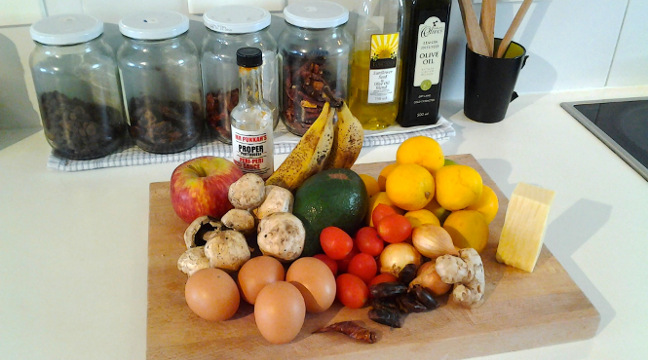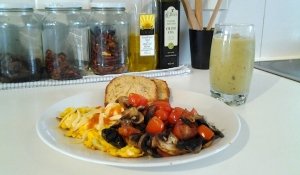
For me, exercise and breakfast set the day in motion. They determine, in some ways, how successful I will be at accomplishing my goals. Therefore, I look forward to each and embrace them as serious fun.
- Wake shortly after sunrise.
- Glance over the railing at the end of the walkway to determine if the surf is good or a pass day. Change into my running shorts or wetsuit then head down to the beach.
- 7.5km, to the second estuary and back again, or surf.
- Return to my flat, shower, and change into my attire for the day.
- Fire up the computer, music that fits the day (anything from Bach to Enya or Fleetwood Mac, Aretha Franklin to George Winston to Styx).
- Fix breakfast and read a science journal or novel while eating.
- Check email, code, research, research, research …
 Today I prepared a fruit smoothie from a half dozen small ice cubes, juice oranges, apple, avocado, handful of dates, ginger and honey. I cook the onions, garlic, and chilli pepper with 4 eggs in a skillet, topped by mushrooms and tomatoes sautéed in unsalted butter and shredded cheese. Prep to consumption: less than thirty minutes including cleaning, doing dishes as I go. If I prep a few items the night before, a quarter of an hour total.
Today I prepared a fruit smoothie from a half dozen small ice cubes, juice oranges, apple, avocado, handful of dates, ginger and honey. I cook the onions, garlic, and chilli pepper with 4 eggs in a skillet, topped by mushrooms and tomatoes sautéed in unsalted butter and shredded cheese. Prep to consumption: less than thirty minutes including cleaning, doing dishes as I go. If I prep a few items the night before, a quarter of an hour total.
Delicious, nutritious, filling and grounding.
It does not take a scientific research study to draw the connection between how we fuel our bodies and how our bodies and minds function. Rather, we need to be reminded of what not long ago came more naturally, when our lives were not so fast-paced, when food preparation was a time to prepare for our day.
Everything you see came from the Ethical Co-Op. Not as pretty as the greenhouse ripened, chemically treated, and wax coated fruits and veggies found in the super market, but that’s the point—this is food before marketing decided it should be shiny, BIG, sweet and fun. Many of us have forgotten that food grows in soil. It is wrinkled, imperfect, and delicious in ways an entire generation has never enjoyed.
Our bodies are nothing more than an expression of what we put in. If we expect a cardboard box, a shrink-wrapped styrofoam tray, or a heavily processed “healthy-start breakfast bar” to replace the real thing, we are a victims of advertising designed to sell nothing more than a chemically engineered product made to look like food and sit on the shelf without going bad such that neither the distributor nor the retailer will report lost income to food gone bad.
In the past fifty years, in the lifetime of my parents, we have gone from carrying canvas bags to and from a small, locally owned market to the expectation that everything we consume comes in a box, plastic bag, carton, or container whose sole function is catching our attention on the shelf, and subsequent, easy transportation to our homes where we quickly discard the packaging.
I often consider the fossil fuel and raw materials consumed to package modern food. Farmed trees cut, transported, shredded, pulped, bleached, stabilised, rolled into paper and cardboard then trimmed, printed, and glued into a box to hold what may be consumed in a single meal. Every plastic container began as a fossil fuel formed 300-500 million years ago. Carbon, trapped deep in the Earth released and processed through the complex, power consumptive process of refining, manufacturing, and distribution in order that we can have four, maybe five spoonfuls of yoghurt or quickly unwrap a breakfast burrito on our way out the door.
This is nothing less than insane! Yet, it has become the norm.
Surely, there is a means to return to a life in which we are closer to our food, making clear our consumer preferences through how we spend our dollars and rand. We can visit local farms, and learn how modern farmers struggle and succeed. We can join farming cooperatives, tend to a community garden one afternoon each month. We can grow tomatoes, peppers, and herbs on window sills and balconies, in the narrow spaces between our homes.
We can return to a breakfast that is as enjoyable to prepare as it is to consume, and rest assured we have engaged in a practice that supports a sustainable mind, body, environment and soul.